江西省南昌二中2017-2018学年高一上学期期末考试英语试卷.doc
- 格式:doc
- 大小:391.51 KB
- 文档页数:9
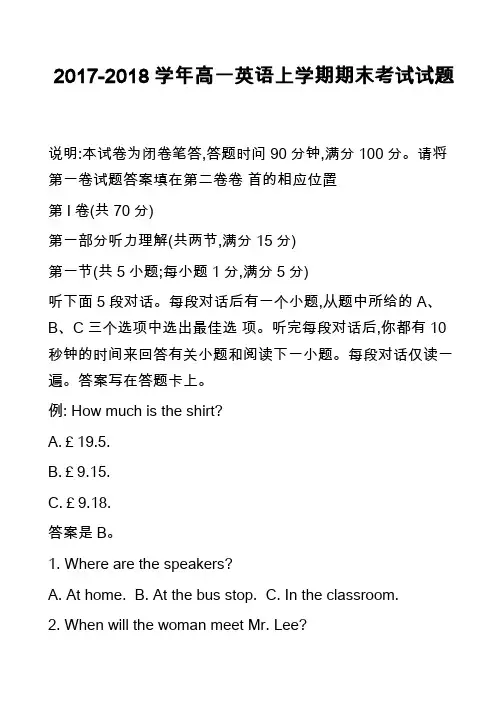
2017-2018学年高一英语上学期期末考试试题说明:本试卷为闭卷笔答,答题时问90分钟,满分100分。
请将第一卷试题答案填在第二卷卷首的相应位置第I卷(共70分)第一部分听力理解(共两节,满分15分)第一节(共5小题;每小题1分,满分5分)听下面5段对话。
每段对话后有一个小题,从题中所给的A、B、C三个选项中选出最佳选项。
听完每段对话后,你都有10秒钟的时间来回答有关小题和阅读下一小题。
每段对话仅读一遍。
答案写在答题卡上。
例: How much is the shirt?A.£19.5.B.£9.15.C.£9.18.答案是B。
1. Where are the speakers?A. At home.B. At the bus stop.C. In the classroom.2. When will the woman meet Mr. Lee?A. Today.B. Tomorrow.C. The day after tomorrow.3. How will the woman go to Paris?A. By taxi.B. By plane.C. By train.4. What is the man probably going to do today?A. Play tennis.B. Look for Peter.C. Go shopping.5. Why is the woman unable to see the movie?A. Because she has to work.B. Because she has no ticket.C. Because she needs a rest第二节(共10小题;每小题1分,满分10分)听下面3段对话或独白。
每段对话或独白后有几个小题,从题中所给的A、B、C三个选项中选出最佳选项。
听每段对话或独白前,你将有时间阅读各个小题,每小题5秒钟。
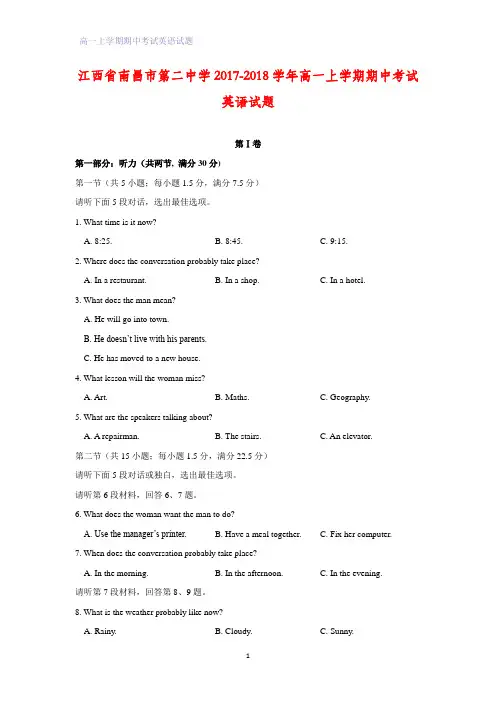
江西省南昌市第二中学2017-2018学年高一上学期期中考试英语试题第Ⅰ卷第一部分:听力(共两节, 满分30分)第一节(共5小题;每小题1.5分,满分7.5分)请听下面5段对话,选出最佳选项。
1. What time is it now?A. 8:25.B. 8:45.C. 9:15.2. Where does the conversation probably take place?A. In a restaurant.B. In a shop.C. In a hotel.3. What does the man mean?A. He will go into town.B. He doesn’t live with his parents.C. He has moved to a new house.4. What lesson will the woman miss?A. Art.B. Maths.C. Geography.5. What are the speakers talking about?A. A repairman.B. The stairs.C. An elevator.第二节(共15小题;每小题1.5分,满分22.5分)请听下面5段对话或独白,选出最佳选项。
请听第6段材料,回答6、7题。
6. What does the woman want the man to do?A. Use the manager’s printer.B. Have a meal together.C. Fix her computer.7. When does the conversation probably take place?A. In the morning.B. In the afternoon.C. In the evening.请听第7段材料,回答第8、9题。
8. What is the weather probably like now?A. Rainy.B. Cloudy.C. Sunny.9. Where will the tourists go first after they leave Big Ben?A. Madame Tussauds.B. Tower of London.C. The London Eye.请听第8段材料,回答第10至12题。
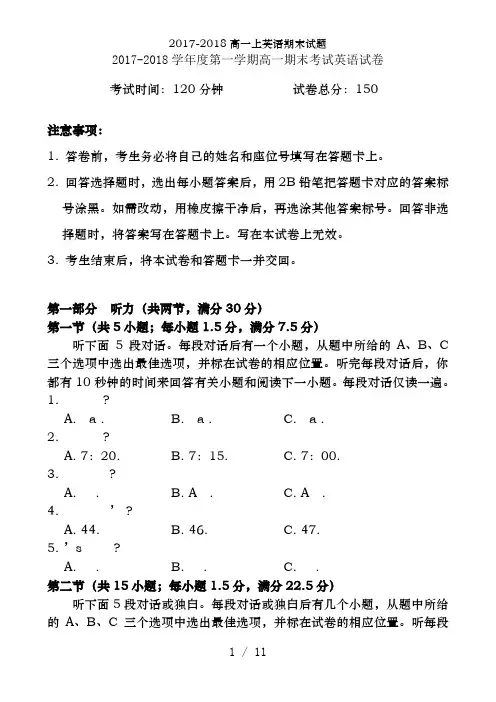
2017-2018学年度第一学期高一期末考试英语试卷考试时间:120分钟试卷总分:150注意事项:1. 答卷前,考生务必将自己的姓名和座位号填写在答题卡上。
2. 回答选择题时,选出每小题答案后,用2B铅笔把答题卡对应的答案标号涂黑。
如需改动,用橡皮擦干净后,再选涂其他答案标号。
回答非选择题时,将答案写在答题卡上。
写在本试卷上无效。
3. 考生结束后,将本试卷和答题卡一并交回。
第一部分听力(共两节,满分30分)第一节(共5小题;每小题1.5分,满分7.5分)听下面5段对话。
每段对话后有一个小题,从题中所给的A、B、C 三个选项中选出最佳选项,并标在试卷的相应位置。
听完每段对话后,你都有10秒钟的时间来回答有关小题和阅读下一小题。
每段对话仅读一遍。
1. ?A. a .B. a .C. a .2. ?A. 7:20.B. 7:15.C. 7:00.3. ?A. .B. A .C. A .4. ’ ?A. 44.B. 46.C. 47.5. ’s ?A. .B. .C. .第二节(共15小题;每小题1.5分,满分22.5分)听下面5段对话或独白。
每段对话或独白后有几个小题,从题中所给的A、B、C三个选项中选出最佳选项,并标在试卷的相应位置。
听每段对话或独白前,你将有时间阅读各个小题,每小题5秒钟;听完后,各小题将给出5秒钟的作答时间。
每段对话或独白读两遍。
听第6段材料,回答第6、7题。
6. ’s ?A. .B. a .C. .7. ?A. 12 .B. 2 .C. 4 .听第7段材料,回答第8、9题。
8. ?A. .B. .C. A .9. 15% ?A. .B. .C. .听第8段材料,回答第10至12题。
10. ?A. .B. .C. a .11. a ?A. .B. .C. .12. ?A. .B. .C. .听第9段材料,回答第13至16题。
13. ?A. a .B. .C. .14. ?A. a .B. .C. a .15. a ?A. .B. .C. .16. ?A. .B. .C. .听第10段材料,回答第17至20题。
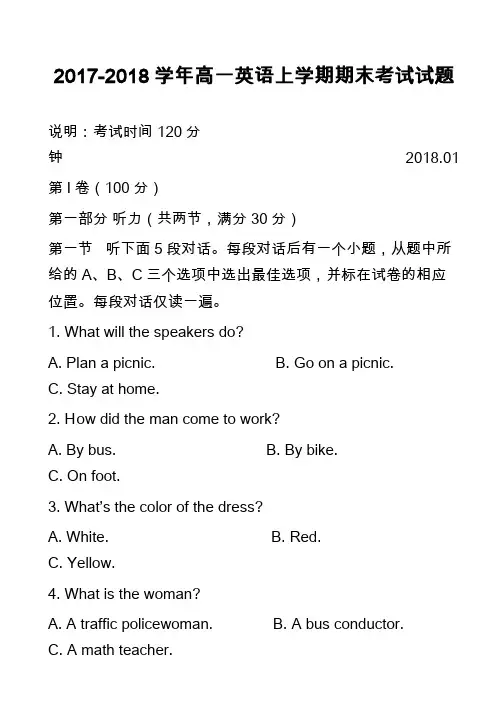
2017-2018学年高一英语上学期期末考试试题说明:考试时间 120分钟 2018.01第I卷(100分)第一部分听力(共两节,满分30分)第一节听下面5段对话。
每段对话后有一个小题,从题中所给的A、B、C三个选项中选出最佳选项,并标在试卷的相应位置。
每段对话仅读一遍。
1. What will the speakers do?A. Plan a picnic.B. Go on a picnic.C. Stay at home.2. How did the man come to work?A. By bus.B. By bike.C. On foot.3. What’s the color of the dress?A. White.B. Red.C. Yellow.4. What is the woman?A. A traffic policewoman.B. A bus conductor.C. A math teacher.5. What does the man think of the English class?A. Dull.B. Interesting.C. Difficult.第二节听下面5段对话或独白。
每段对话或独白后有几个小题,从题中所给的A、B、C三个选项中选出最佳选项,并标在试卷的相应位置。
每段对话或独白读两遍。
听下面一段对话,回答第6至7题。
6. Which grade is John in?A. Senior One.B. Senior Two.C. Junior Three.7. What is John’s problem?A. The teachers are too strict.B. The subjects are difficult.C. His classmates are not easy-going.听下面一段对话,回答第8至9题。
8. What is Tom busy doing?A. Watching TV.B. Playing computer games.C. Chatting on the phone.9. How long does Tom plan to spend on his vacation homewo rk?A. Three days.B. Ten days.C. One week.听下面一段对话,回答第10至12题。
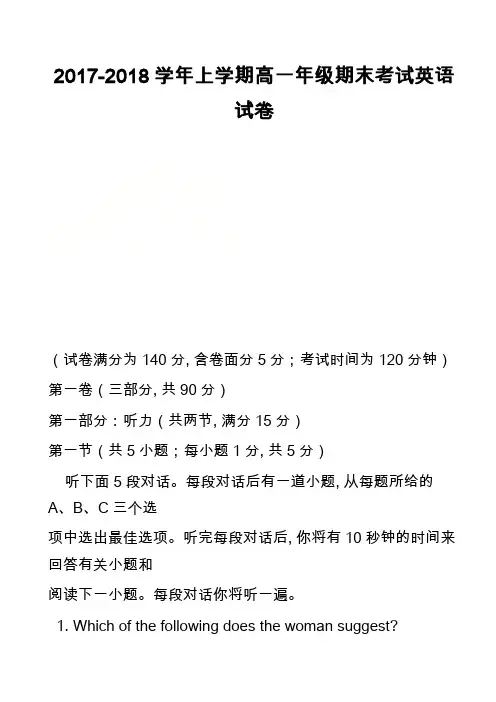
2017-2018学年上学期高一年级期末考试英语试卷(试卷满分为140分, 含卷面分5分;考试时间为120分钟)第一卷(三部分, 共90分)第一部分:听力(共两节, 满分15分)第一节(共5小题;每小题1分, 共5分)听下面5段对话。
每段对话后有一道小题, 从每题所给的A、B、C三个选项中选出最佳选项。
听完每段对话后, 你将有10秒钟的时间来回答有关小题和阅读下一小题。
每段对话你将听一遍。
1. Which of the following does the woman suggest?2. What kind of novels does the woman like most?A. Fantasies.B. Science fictions.C. Detective stories.3. When do high schools usually start?A. At 8:30AM.B. At 8:15AM.C. At 7:30AM.4. What does the man invite the woman to do?A. Plan a wedding.B. Watch a new movie.C. Go to a concert.5. Where does the conversation most probably take place?A. At a gas station.B. At a car wash.C. At a repair shop.第二节(共10小题;每小题1分, 共10分)听下面4段对话或独自。
每段对话或独白后有几道小题, 从每题所给的A、B、C三个选项中选出最佳选项。
听每段对话或独白前, 你将有5秒钟的时间阅读每小题。
听完后, 每小题将给出5秒钟的作答时间。
每段对话或独白你将听两遍。
听第6段材料, 回答第6至7题。
6. What's the man's favorite food?A. Fruit salad.B. Apple pie.C. Chocolate shake.7. Why doesn't the man want to eat?A. He doesn’t like the woman's cooking.B. He has alread y had something.C. He is not feeling very well.听第7段材料, 回答第8至9题。
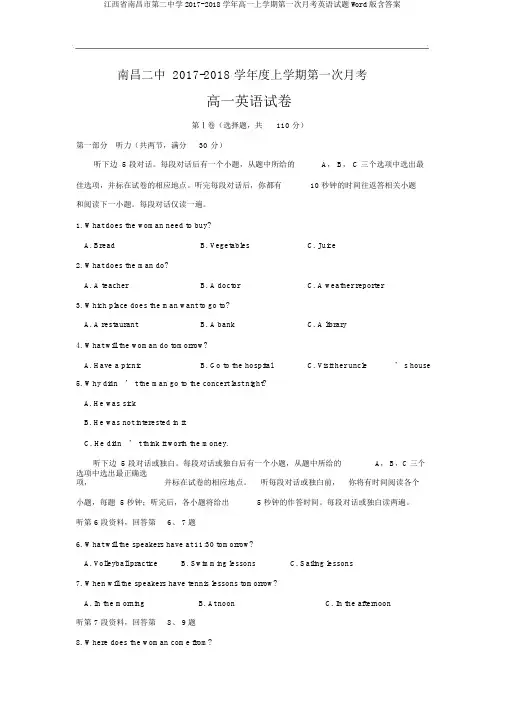
南昌二中 2017-2018 学年度上学期第一次月考高一英语试卷第Ⅰ卷(选择题,共110 分)第一部分听力(共两节,满分30分)听下边 5 段对话。
每段对话后有一个小题,从题中所给的A, B, C 三个选项中选出最佳选项,并标在试卷的相应地点。
听完每段对话后,你都有10 秒钟的时间往返答相关小题和阅读下一小题。
每段对话仅读一遍。
1.What does the woman need to buy?A. BreadB. VegetablesC. Juice2.What does the man do?A. A teacherB. A doctorC. A weather reporter3.Which place does the man want to go to?A. A restaurantB. A bankC. A library4.What will the woman do tomorrow?A. Have a picnicB. Go to the hospitalC. Visit her uncle’ s house5.Why didn ’ t the man go to the concert last night?A.He was sickB.He was not interested in it.C.He didn ’ t think it worth the money.听下边 5 段对话或独白。
每段对话或独白后有一个小题,从题中所给的A, B,C 三个选项中选出最正确选项,并标在试卷的相应地点。
听每段对话或独白前,你将有时间阅读各个小题,每题 5 秒钟;听完后,各小题将给出 5 秒钟的作答时间。
每段对话或独白读两遍。
听第 6 段资料,回答第6、 7题6.What will the speakers have at 11:30 tomorrow?A. Volleyball practiceB. Swimming lessonsC. Sailing lessons7.When will the speakers have tennis lessons tomorrow?A. In the morningB. At noonC. In the afternoon听第 7 段资料,回答第8、 9题8.Where does the woman come from?A. MadridB. GetafeC. New York9. What does the man think of living in his hometown?A. ExpensiveB. BoringC. Lucky听第 8 段资料,回答第10、 11、 12 题10. Where are the speakers?A. In a hotelB. In a hospitalC. In the woman’ s house11.How long can the bathroom be used?A. 7 hoursB. 8 hoursC.13 hours12.Where should the man put his wallet?A. In a boxB. Under his bedC. On a table听第 9 段资料,回答第13、14、 15、 16 题13.What are the speakers discussing?A.The way of studyingB.The habit of studying aloneC.The advantage of studying with friends14.What is the g irl ’ s opinion on studying with friends when the work is hard?A. It’ s noisyB. It’ s boringC. It’ s helpful15. What does the boy do with his friends to remember vocabulary?A. Make gamesB. Watch televisionC. Listen to music16.What do we know about the boy?A.He listens to the radio when studying.B.He doesn ’ t have a computer.C.He seldom uses the Internet.听第 10 段资料,回答第17、 18、 19、 20 题17.What is the speaker mainly talking about?A.The film industry in IndiaB.The brief introduction to Bollywood.C.The comparison between Bollywood and Hollywood.18.What does the speaker say about Bollywood?A. It is the biggest film industry in the world.B. It produces 29000 films a year.C. It pays the actors much.19.What do most Indians like doing during their free time?A. Doing sportsB. Singing and dancingC. Watching films20.How much do most Bollywood films cost?A. $ 2,000,000B.$ 5,000,000C. $500,000,000第二部分:英语知识运用(共两节,满分40 分)第一节:单项选择(共10 小题;每题 1 分,满分10 分)21.Now most of the shops in big city ____ open until late into the night.A. leaveB. stayC. is keptD. put22.This publishing firm is planning ______ school text book.A. a series new ofB. new a series ofC. a series newD. a new series of23.To be thought of as honest , you should always ______ .A. clear awayB. keep your words C make sense D make a go of it24.If you want to do international trade successfully, ______ of English is _______.A. good command; a mustB. a good command; a needC. a good command; a mustD. good command; must25.She pretended to be calm but _______she was more than nervous at the time she was beingquestioned.A. in actualB. actuallyC. as matter of factD. in a fact26.Some people are good at _____ voices on the phone while others ______.A. knowing; aren’ tB. recognizing; don’ tC. knowing; don’ tD. recognizing; aren’ t27.We would rather die than ______ difficulty.A. give up toB. give in toC. give way toD. give back to28.The determined look in their eyes told us that nothing could make them ______.A. change their mindB. to change their mindsC. change their mindsD. to change their mind29.The hunter insisted that he _____ a tiger and that a searching team ______ to hunt for it.A. has seen; be set upB. had seen; be set upC. saw; was set upD. should see; was set up30.Green tree frog, _____live in treesA. eventuallyB. unfortunatelyC. even thoughD. as the name suggests第二节完形填空(共20 小题,每题 1.5分,满分 30 分)People always say that the earlier one learns a language, the31it is to do so, in theory it is that,32, in my opinion, that refers to spoken language. Capability( 能力 ) to practice some essential( 基本的 )33of a language and read between the lines can only be trained through proper reading ways and hard work34 .So spending money to help35learn English may36up with disappointment.It is likely that the more you37, the more you are let down.The daughter of one of my friends38English in primary school,39her foreign teacher’blindness40psychology. She did not want to go on41English until middle school,42 a college student studying English slowly43her interest in the language.It is better to have the child learn Chinese than to have some difficulty44learning English for several years. Having been engaged in English education,45find that despite( 尽管 )their excellent46, many students have47command of English words and phrases. So I suggest that children48classical Chinese prose(散文 ), rather than49 them to learn English hurriedly. Otherwise,they may let go the best time to50the language ability of their mother tongue.31.A. easy B. difficult C. easier D. more difficult32.A. but B. however C. though D. yet33.A. opinions B. regards C. requests D. expressions34.A. step by step B. right away C. at once D. quickly35.A. people B. girls C. children D. boys36.A. begin B. start C. finish D. end37.A. pay B. get C. buy D. take38.A. loved B. liked C. disliked D. learned39.A. because of B. because C. instead of D. instead40.A. of B. at C. in D. to41.A. learning B. to learn C. with learning D. for learning42.A. while B. where C. when D. as43.A. introduced B. practiced C. explained D. developed44.A. in B. to C. at D. of45.A. He B. I C. She D. They46.A. pronunciation B. phrase C. language D. writing47.A. few B. less C. little D. fewer48.A. write B. do C. remember D. memorize49.A. have B. let C. cause D. make50.A. study B. improve C. learn D. master第三部分阅读理解(共 20 小题,每题 2 分,满分 40 分)第一节 (共 15 小题;每题 2 分,满分30 分)阅读以下短文,从每题所给的四个选项中,选出最正确选项,并在答题卡大将该项涂黑。
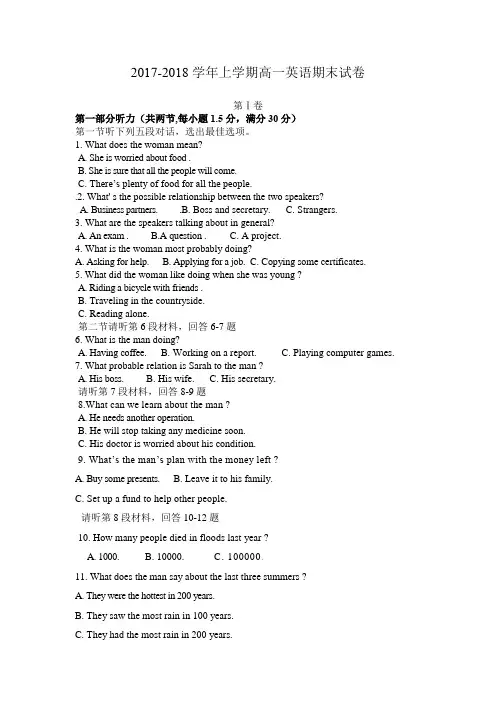
2017-2018学年上学期高一英语期末试卷第Ⅰ卷第一部分听力(共两节,每小题1.5分,满分30分)第一节听下列五段对话,选出最佳选项。
1. What does the woman mean?A. She is worried about food .B. She is sure that all the people will come.C. There’s plenty of food for all the people..2. What' s the possible relationship between the two speakers?A. Business partners. .B. Boss and secretary.C. Strangers.3. What are the speakers talking about in general?A. An exam .B.A question .C. A project.4. What is the woman most probably doing?A. Asking for help.B. Applying for a job.C. Copying some certificates.5. What did the woman like doing when she was young ?A. Riding a bicycle with friends .B. Traveling in the countryside.C. Reading alone.第二节请听第6段材料,回答6-7题6. What is the man doing?A. Having coffee.B. Working on a report.C. Playing computer games.7. What probable relation is Sarah to the man ?A. His boss.B. His wife.C. His secretary.请听第7段材料,回答8-9题8.What can we learn about the man ?A. He needs another operation.B. He will stop taking any medicine soon.C. His doctor is worried about his condition.9. What’s the man’s plan with the money left ?A. Buy some presents.B. Leave it to his family.C. Set up a fund to help other people.请听第8段材料,回答10-12题10. How many people died in floods last year ?A. 1000.B. 10000.C. 100000.11. What does the man say about the last three summers ?A. They were the hottest in 200 years.B. They saw the most rain in 100 years.C. They had the most rain in 200 years.12. What does he think governments around the world should do?A. Invest more to improve the environment.B. Join together to solve the problem.C. Set up more environmental organizations.请听第9段材料,回答13-16题13.What does the woman think of Aiko?A. Out-goingB. HumorousC. Quiet14. Where does Rose come from?A. Italy.B. Turkey.C. Panama.15. What did Peter look like?A. He was very tall.B. He had curly hair.C. He wore a hat all the time.16. What does the woman say about Mike?A. He comes from Japan.B. He is her best friend in class.C. His character is very different from Peter’s.请听第10段材料,回答17-20题17. Where did the story take place?A. In a restaurant.B. In a hotel.C. In an office.18. Which gesture can express someone is hungry in Italy?A. Open one’s mouth and put a finger in it.B. Put one’s hands on his stomach.C. Move lips again and again.19. How did the Englishman get what he wanted?A. By copying the other man’s gesture.B. By smiling to the waiter.C. By explaining in simple Italy.20. What can we learn about the Englishman?A. He was foolish.B. He was humorous.C. He was clever.第二部分:阅读理解(共两节,满分40分)第一节(共15小题;每小题2分,满分30分)阅读下列短文,从每题所给的四个选项(A、B、C和D)中,选出最佳选项,并在答题卡上将该选项涂黑。
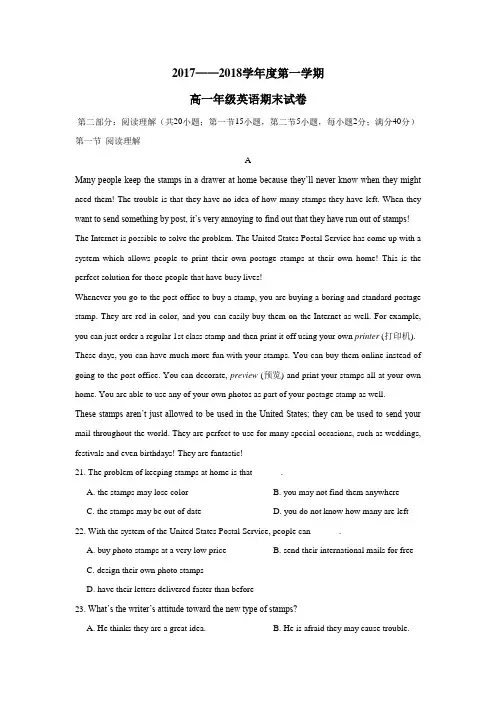
2017——2018学年度第一学期高一年级英语期末试卷第二部分:阅读理解(共20小题;第一节15小题,第二节5小题,每小题2分;满分40分)第一节阅读理解AMany people keep the stamps in a drawer at home because they’ll never know when they might need them! The trouble is that they have no idea of how many stamps they have left. When they want to send something by post, it’s very annoying to find out that they have run out of stamps! The Internet is possible to solve the problem. The United States Postal Service has come up with a system which allows people to print their own postage stamps at their own home! This is the perfect solution for those people that have busy lives!Whenever you go to the post office to buy a stamp, you are buying a boring and standard postage stamp. They are red in color, and you can easily buy them on the Internet as well. For example, you can just order a regular 1st class stamp and then print it off using your own printer (打印机). These days, you can have much more fun with your stamps. You can buy them online instead of going to the post office. You can decorate, preview (预览) and print your stamps all at your own home. You are able to use any of your own photos as part of your postage stamp as well.These stamps aren’t just allowed to be used in the United States; they can be used to send your mail throughout the world. They are perfect to use for many special occasions, such as weddings, festivals and even birthdays! They are fantastic!21. The problem of keeping stamps at home is that ______.A. the stamps may lose colorB. you may not find them anywhereC. the stamps may be out of dateD. you do not know how many are left22. With the system of the United States Postal Service, people can ______.A. buy photo stamps at a very low priceB. send their international mails for freeC. design their own photo stampsD. have their letters delivered faster than before23. What’s the writer’s attitude toward the new type of stamps?A. He thinks they are a great idea.B. He is afraid they may cause trouble.C. He thinks they save a lot of money.D. He thinks they are as good as the traditional ones.BScientists say cutting down trees is threatening one of Mexico’s most famous insects. Satellite (卫星) pictures show large wooded areas have been cleared from central Mexico. The forests are the winter home for millions of monarch butterflies (黑脉金斑蝶). The butterflies travel there each year to reproduce (繁殖).Each year, more than two hundred thousand people travel to Mexico to see the butterflies. From November to March, millions of butterflies can be seen in the trees and the sky. Mexican officials hope that by protecting the forests, they can increase the number of visitors.These satellite pictures show the Monarch Butterfly Biosphere Reserve. About four hundred forty-five hectares (公顷) have been cleared illegally (非法地) since 2004. Scientists say that, if the clearing continues, monarch butterflies will not use the reserve as their winter home.For thousands of years, the butterflies have been flying to the same forests. Their trip goes along Canada and the northeastern United States. It is about four thousand eight hundred kilometers. The insects fly about eighty kilometers a day. They reach central Mexico after about sixty days.No one is sure why the brightly-colored orange and black butterflies choose these forests. However, some scientists believe the area might offer the right wetness and cool weather to keep the insects alive through the winter.24. If people continue cutting down trees, monarch butterflies ______.A. will stop reproducingB. will not go there in winterC. will die out in the next few yearsD. will be protected by Mexican law25. From the text, we can learn that the trip of monarch butterflies ______.A. started about 100 years agoB. is from the United States to Central MexicoC. is about two months longD. is more than five thousand kilometers26. Why do monarch butterflies choose the forests as their winter home according to the scientists?A. The warm weather.B. The dry air.C. The wet ground.D. The high temperature.27. What is the text mainly about?A. How a monarch butterfly grows up.B. Monarch butterflies’ winter home is in danger.C. The main habitats of monarch butterflies disappeared.D. What the Mexican government does to protect butterflies.CEyesight problems are common among all ages and if they are left untreated, they can cause serious headaches or other problems. The good news is that most eyesight problems can easily be sorted out by wearing glasses.Regular eye tests are important for everyone. Children and teenagers, under the age of 16 and up to the age of 19 for those full-time education, have the right to have eye tests for free in Britain. As the eye test is free, there’s no excuse for not having a regular eye test. Doctors suggest that it’s better to have an eye test about once a year.Wearing glasses isn’t always regarded as all that cool and teens who suddenly need to wear glasses may find it difficult to accept. If they’ve grown up wearing glasse s, then they may be more used to it. However, if your eyes are in poor health, not wearing glasses can put even more pressure on your eyes and could make them even worse.Thankfully, the days of little choice of glasses frames (框架) for teenagers are gone a nd there’s now a wide selection of frames. If a teen does need to wear glasses, then it’s good to let him or her choose the type, as he or she will be able to choose something he or she feels comfortable. Don’t forget to be guided by the experts on glasses too.28. According to the text, teens in the UK ______.A. have few eyesight problemsB. can design their own glassesC. change their glasses very oftenD. can check their eyes without paying29. How often do doctors suggest teens to have an eye test?A. Once a month.B. Once every six months.C. Once a year.D. Twice a year.30. It can be learned from the text that teens ______.A. find it difficult to buy comfortable glassesB. prefer to wear cool glasses at an early ageC. are advised to wear glasses if their eyesight is poorD. think they are much cooler when wearing glasses31. In the text, the writer mainly wants to tell us ______.A. how to talk with doctorsB. at what age to wear glassesC. how to buy the suitable glassesD. how to treat eyesight problemsDExperts recently said that people could slow global warming by changing the color of the rooftops (屋顶). They said sunlight, and its heat, will reach the surface of a white-colored roof and almost all can be reflected (反射) back. However, dark rooftops hold in more than eighty percent of the energy from sunlight. This is why there are white-and-light-colored buildings in many warm areas of the world.Researchers have estimated(评估) the effects that white roofs could have on the planet. Their study considers painting sixty-three percent of rooftops white in one hundred large cities in warm areas around the world. The scientists estimate this would have the same climate result as taking all cars in the world off the road for ten years. It would also save money on indoor air cooling costs.A writer has some ideas for families which are planning to travel on vacation by car. She writes that the most important thing on a road trip is planning. Try to find new and fun things to do as close to your home as possible. Produce less waste by bringing food and drinks for the trip in re-usable containers.In the future, car travelers may see the Green Roadway Project, collecting power from the sun and the wind along roads, highways and railways throughout the United States. The power would be used to create energy for homes and businesses nearby. The roads would even have power stations for charging electric cars.32. Experts suggest white-colored roofs because they can ______.A. make the air much fresherB. help keep the earth coolC. be recognized in the distanceD. make the city look more beautiful33. In Paragraph 3, the writer advises people to ______.A. change traveling timesB. have a short trip near your homeC. put rubbish into containersD. take home-cooked food on trips34. What will the Green Roadway Project do?A. It will control the traffic in cities.B. It will deal with pollution problems.C. It will repair broken cars on the road.D. It will provide power for local people.35. From the text, we can learn that the writer ______.A. is concerned about the environmentB. shows interest in modern high-techC. is worried about people’s behaviorD. thinks highly of scientists’ r esearch第二节根据短文内容,选出能填入空白处的最佳选项,其中两项为多余选项。
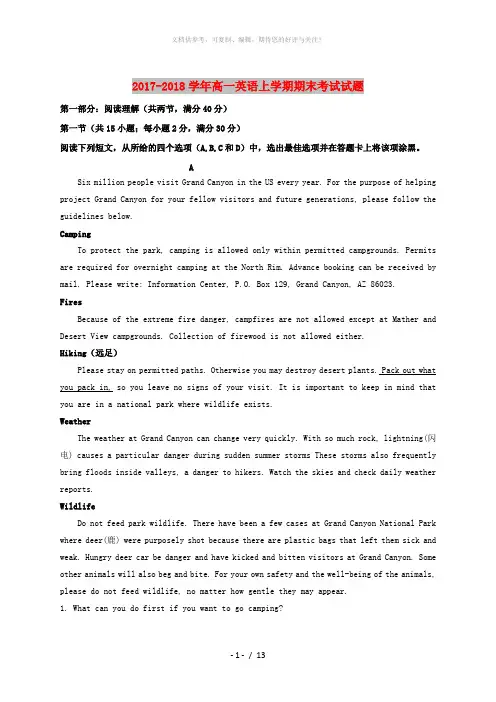
2017-2018学年高一英语上学期期末考试试题第一部分:阅读理解(共两节,满分40分)第一节(共15小题;每小题2分,满分30分)阅读下列短文,从所给的四个选项(A,B,C和D)中,选出最佳选项并在答题卡上将该项涂黑。
ASix million people visit Grand Canyon in the US every year. For the purpose of helping project Grand Canyon for your fellow visitors and future generations, please follow the guidelines below.CampingTo protect the park, camping is allowed only within permitted campgrounds. Permits are required for overnight camping at the North Rim. Advance booking can be received by mail. Please write: Information Center, P.O. Box 129, Grand Canyon, AZ 86023.FiresBecause of the extreme fire danger, campfires are not allowed except at Mather and Desert View campgrounds. Collection of firewood is not allowed either.Hiking(远足)Please stay on permitted paths. Otherwise you may destroy desert plants. Pack out what you pack in, so you leave no signs of your visit. It is important to keep in mind that you are in a national park where wildlife exists.WeatherThe weather at Grand Canyon can change very quickly. With so much rock, lightning(闪电) causes a particular danger during sudden summer storms These storms also frequently bring floods inside valleys, a danger to hikers. Watch the skies and check daily weather reports.WildlifeDo not feed park wildlife. There have been a few cases at Grand Canyon National Park where deer(鹿) were purposely shot because there are plastic bags that left them sick and weak. Hungry deer car be danger and have kicked and bitten visitors at Grand Canyon. Some other animals will also beg and bite. For your own safety and the well-being of the animals, please do not feed wildlife, no matter how gentle they may appear.1. What can you do first if you want to go camping?A. Know the permitted pathsB. Stop at Mather and Desert ViewC. Make sure not to make a fireD. Book campgrounds in advance2.What do the underlined words “pack out what you pack in” in Paragraph 4 probably mean?A. keep everything out of campgroundsB. take away everything you bring inC. carry all the necessary foodD. look after your personal belongings3. Why were some deer killed on purpose at Grand Canyon?A. They begged food from visitorsB. They were a danger to other gentle animalsC. They ate wrong things and bee very illD. They kicked and bit visitors4. What is the main purpose of the text?A. To provide travel informationB. To report some recent newsC. To teach tourists hiking skillsD. To introduce the wild lifeBWhen I was a boy, I was always happy to see those little brown coins. After years I was still very happy to pick up pennies on the ground, I usually saved them up. I usually bought a pack of gum or a bag of chips when it was enough. After growing up, I heard a story about coins. It was said that our loved people sometimes would leave pennies on the ground in front of us. People wanted to show us that we were loved and watched over kindly. I never doubted that story even as an adult. It is difficult for me to find a lot of money on the ground, but pennies are there all the time. Maybe that is why I still enjoy seeing them and picking them up, no matter how dirty or old they are.A few months ago, I was walking to the local post office to mail a letter. As I entered the room, I saw not one, not two, but four pennies shining in the sunlight. I smiled and picked them up. I kept them in my hands as I walked in the post office. “Four is Ok,” an office said to a lady. The lady began searching her purse. Her face went red. I understood what had happened. I laughed to myself at this surprising moment. I placed my pennies on the desk before her. The smile I got in return was worth a thousand dollars.The coins weren’t so valuable to me, but they did matter to her. I just performeda little kindness. I was happy.5. What might the author probably buy when he saved enough pennies?A. A set of storybooksB. A pack of chipsC. A box of chocolatesD. A bag of sugar6. When grown up, the author .A. saw some careless women lost coinsB. thought rich people threw coins on purposeC. still believed the story about coinsD. found old people forget coins on the ground7. What can we learn from this passage?A. Doing small acts of kindness is goodB. Every coin should be used to buy important thingsC. We should look for coins when we are walkingD. Pay more attention to what you hear from now onCI was having a picnic day with my sister. We both like to ride her motorcycle and that day we drove to the nearest park. We bought some coffee and cakes, and then we were enjoying our food. Within a few hours, the sky was changing and looked ready to drop a heavy rain. We packed everything and were ready to go. My sister, who was sitting on a bench, suddenly was very still and couldn’t talk to me. she didn’t move. Her eyes were rolling and she was about to lose consciousness(知觉). I held her in my arms and asked if she wanted to rest. She didn’t answer and only said “Sorry”.It started to rain and I didn’t know what to do. She was fighting to stay aware but her skin was pale and her eyes were acting strange. Suddenly, from nowhere, a woman on a bicycle appeared, wearing a raincoat. “She isn’t looking good. Do you want me to call an ambulance(救护车)?” “Yes, please, yes!” I begged.She did. Struggling with the rain, she managed to call some policemen, who quickly helped me carry my sister to a safer place. The ambulance arrived and we went to a hospital, where she was treated in time and she came to life in the morning after rest and medical help.An interesting fact was that I guessed the woman in the raincoat was a doctor or a nurse. I later learned from one of the police officers who told me: “No, she was an ordinary person who took some courses on emergency situations(紧急情況).I am so grateful that she appeared ex actly at he right moment. I don’t know why orhow. I didn’t even get the chance to say thanks to her.8. What happened to the author and her sister?A. They had a fightB. Her sister fell ill suddenlyC. They were caught in the rainD. They had difficulty packing things9. How did the woman help the author?A. By giving first aid to her sisterB. By protecting her sister from the rainC. By carrying he sister to the hospitalD. By asking for emergency medical help10. Why did the woman call the policemen?A. To keep order in the parkB. To send the sick girl to hospitalC. To pull the sick girl to a safer place quicklyD. To carry the sick girl onto the ambulance11. What was the author’s main attitude towards the woman?A. ThankfulB. FriendlyC. DoubtfulD. AdmirableDYou might think people all over the United States have Wi-Fi----wireless Internet service---and mobile phones. But there is no such service in Green Bank, West Virginia, a tiny town four hours from the U. S. capital, Washington D. C. Fewer than 150 people live in Green Bank, which has two churches, an elementary school and a public library. It is also home to the largest radio telescope in the world.There is a ban(禁令)on Wi-Fi in Green Bank, along with anything else that can create electromagnetic(电磁的)waves. Officials say the waves could disturb the signals(信号)the telescope receives.For many Americans, a visit to Green Bank is a little like returning to the 1950s. To get there, you must read road signs---because there is no GPS service in the town. People can connect with the Internet through telephones, but wireless service is not allowed. The observatory(天文台)is one of the largest employers in the area. The federal National Science Foundation (NSF)spends about $8.2 million a year to operate the observatory,telescope and educational center.Jonah Bauserman is a technician. If he supposes there is a signal that is not allowed in the zone, he drives to the house where the signal is ing from and checks it. but once a week, when the device is cleaned, e banned devices are allowed near it.People in the town respect the work of the scientists. And they say they are happy to live without Wi-Fi and mobile phones. “You know, instead of sitting here on our ph ones and other devices we’re out fishing and hunting and going to each other’s houses.” Everyone knows each other and munication is almost always face-to-face.12. What will you are see when you pay a visit to Green Bank?A. GPS serviceB. Radio-controlled toysC. Cell phone towersD. Guide posts13. What is Jonah Bauserman’s duty in his work?A. Following signals from cell phonesB. Cleaning the telescope once a weekC. Listening for signals from outer spaceD. Protecting the telescope from being affected14. What has the telescope brought to the local people?A. Great wealthB. A healthier lifestyleC. Many job chancesD. Much difficulty in life15. What may be the best title for this text?A. An American Town Without Wi-Fi and Mobile PhonesB. Good Relationships Between people in an American TownC. The Largest Radio Telescope in the WorldD. A Better Life Without Wireless Devices第二节(共5小题;每小题2分,满分10分)根据短文内容,从短文后的选项中选出能填入空白处的最佳选项,选项中有两项为多余选项。
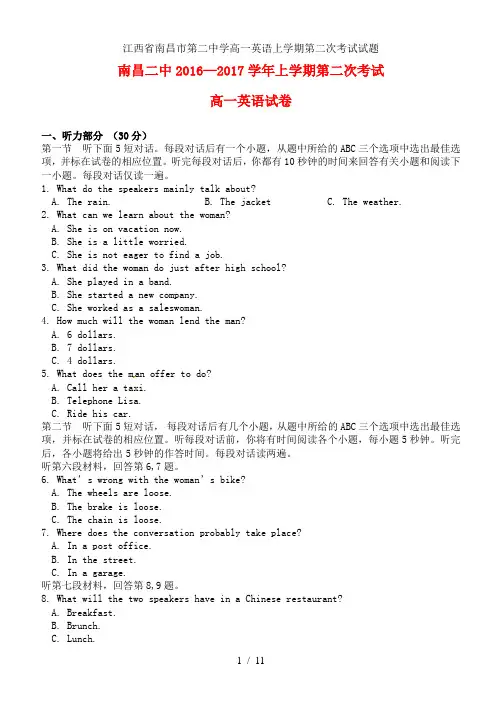
南昌二中2016—2017学年上学期第二次考试高一英语试卷一、听力部分(30分)第一节听下面5短对话。
每段对话后有一个小题,从题中所给的ABC三个选项中选出最佳选项,并标在试卷的相应位置。
听完每段对话后,你都有10秒钟的时间来回答有关小题和阅读下一小题。
每段对话仅读一遍。
1. What do the speakers mainly talk about?A. The rain.B. The jacketC. The weather.2. What can we learn about the woman?A. She is on vacation now.B. She is a little worried.C. She is not eager to find a job.3. What did the woman do just after high school?A. She played in a band.B. She started a new company.C. She worked as a saleswoman.4. How much will the woman lend the man?A. 6 dollars.B. 7 dollars.C. 4 dollars.5. What does the m an offer to do?A. Call her a taxi.B. Telephone Lisa.C. Ride his car.第二节听下面5短对话,每段对话后有几个小题,从题中所给的ABC三个选项中选出最佳选项,并标在试卷的相应位置。
听每段对话前,你将有时间阅读各个小题,每小题5秒钟。
听完后,各小题将给出5秒钟的作答时间。
每段对话读两遍。
听第六段材料,回答第6,7题。
6. What’s wrong with the woman’s bike?A. The wheels are loose.B. The brake is loose.C. The chain is loose.7. Where does the conversation probably take place?A. In a post office.B. In the street.C. In a garage.听第七段材料,回答第8,9题。
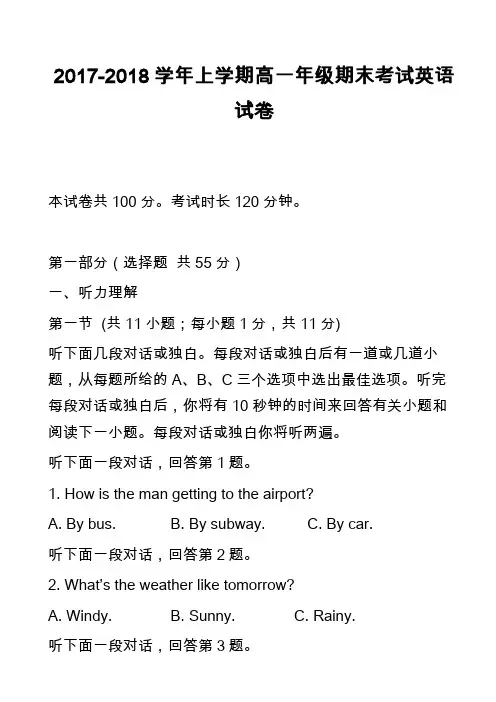
2017-2018学年上学期高一年级期末考试英语试卷本试卷共100分。
考试时长120分钟。
第一部分(选择题共55分)一、听力理解第一节 (共11小题;每小题1分,共11分)听下面几段对话或独白。
每段对话或独白后有一道或几道小题,从每题所给的A、B、C三个选项中选出最佳选项。
听完每段对话或独白后,你将有10秒钟的时间来回答有关小题和阅读下一小题。
每段对话或独白你将听两遍。
听下面一段对话,回答第1题。
1. How is the man getting to the airport?A. By bus.B. By subway.C. By car.听下面一段对话,回答第2题。
2. What’s the weather like tomorrow?A. Windy.B. Sunny.C. Rainy.听下面一段对话,回答第3题。
3. What is the man doing?A. Offering help.B. Asking for advice.C. Expressing wis hes.听下面一段对话,回答第4至第5题。
4. What did the woman buy at the bookshop?A. A novel.B. A newspaper.C. A crossword puzzle .5. What is the man interested in?A. Sports.B. Business.C. News.听下面一段独白,回答第6至第8题。
6. Who are the listeners?A. Patients.B. Visitors.C. Nurses.7. When can visitors see patients?A. At 2:00 pm.B. At 5:30 pm.C. At 7:30 pm.8. What is the speaker doing?A. Introducing the schedules.B. Explaining the hospital rules.C. Describing the radio program.听下面一段对话,回答第9至第11题。
2017-2018学年高一英语上学期期末考试试题本试卷分第Ⅰ卷(选择题)和第Ⅱ卷(非选择题)两部分,共4页。
考试结束后,将答题卡交回。
注意事项:1. 答题前,考生先将自己的姓名、准考证号填写清楚,将条形码准确粘贴在考生信息条形码粘贴区。
2.选择题必须使用2B铅笔填涂;非选择题必须使用0.5毫米黑色字迹的签字笔书写,字体工整、笔迹清楚。
3.请按照题号顺序在各题目的答题区域内作答,超出答题区域书写的答案无效;在草稿纸、试题卷上答题无效。
4.作图可先使用铅笔画出,确定后必须用黑色字迹的签字笔描黑。
5. 保持卡面清洁,不要折叠,不要弄破、弄皱,不准使用涂改液、修正带、刮纸刀。
第Ⅰ卷I. 听力(共两节,满分 30 分)第一节(共 5 小题;每小题 1.5分,满分7.5分)听下面 5 段对话。
每段对话后有一个小题,从题中所给的 A、B、C 三个选项中选出最佳选项,并标在试卷的相应位置。
听完每段对话后,你都有 10 秒钟的时间来回答有关小题和阅读下一小题。
每段对话仅读一遍。
What are they talking about?Plans . B. Experience.C. WeatherWhen will the man invite the woman to have dinner?On Wednesday evening.On Thursday evening.On Sunday evening.What’s the most possible relationship between the two speak ers?Friends B. Neighbours.C. StrangersWhy did the man quarrel with his neighbor?Because his neighbor thought he had laughed at her. Because he did something seriously wrong.Because he had broken her window.How much does the man need to pay?3 dollars B. 3.5 dollars.C. 5 dollars.第二节:(共 15 小题;每小题 1.5分,满分 22.5 分)听下面 5 段对话或独白。
江西省南昌市第二中学2017-2018学年高三上学期第二次考试英语试题Word版含答案南昌二中2017-2018学年度上学期第二次考试高三英语试卷第一部分:听力(共两节,满分30分)第一节(共5小题;每小题1.5分,满分7.5分)听下面5 段对话。
每段对话后有一个小题,从题中所给的A、B、C 三个选项中选出最佳选项,并标在试卷的相应位置。
听完每段对话后,你都有10秒钟的时间来回答有关小题和阅读下一小题。
每段对话仅读一遍。
1. How much do the tickets for the concert cost?A. $80B. $40C. $602. What subject does the woman think is less difficult?A. History.B. Mathematics.C. Literature.3. What does the woman mean?A. She is only too pleased to come.B. She didn’t go in for mountaineering.C. She was an excellent mountain-climber.4. Where is the man going first?A. To the Healey Supermarket.B. To the airport.C. To Canada.5. What does the woman most probably think of the man?A. Naughty.B. Kind-hearted.C. Careless.第二节(共15小题;每小题1.5分;满分22.5分)听下面5 段对话或独白。
每段对话或独白后有2至4个小题, 从题中所给的A、B、C 三个选项中选出最佳选项,并标在试卷的相应位置。
听每段对话前,你将有5秒钟的时间阅读各个小题;听完后,各小题将给出5秒钟的做答时间。
2017-2018学年第一学期高一英语期末试卷考试时间:120分钟总分:120分一、阅读理解(共两节,满分40分)第一节:阅读理解(共15小题;每小题2分,满分30分)A“Tipping” (给小费) is always a difficult business. You do not want to give too much or too little,or tip the wrong person.In Britain and America,people usually tip waiters in restaurants, porters, taxi drivers and hairdressers. They do not tip people in offices, cinemas,garages or airports.Do you invite your friend to the restaurant?Then you pay the bill. Does your friend invite you?Your friend pays. If there are men and women in the party, the men usually pay.These days,men and women are equal in many ways. If you work in Britain or America, your boss could be a man or a woman. There are increasing numbers of women in important positions in politics, law, medicine and in the business world. But it is still polite for men to open doors for women and to ask them to go first. And it is polite for men to stand up when they are introduced to women.1. In this passage, the writer tells us ______.A. not to give any tip to othersB. only to give tip to womenC. only to give tip in restaurantsD. to give tip to the right person2. If you have had a meal with your friend in a restaurant, ______.A. you should pay the billB. your friend should pay the billC. the person who invites the other person should pay the billD. you should ask your friend to pay the bill3. Today in Britain and America ______.A. women are completely equal to menB. men hold all the important positions in politicsC. women hold all the important positions in businessD. women have changed their conditions in many ways4. It is impolite for a man to ______.A. open a door for a woman and to go first himselfB. stand beside a womanC. let a woman go firstD. stand up when he is introduced to a womanBOne afternoon I toured an art museum while waiting for my husband to finish a business meeting. I was looking forward to a quiet view of the art works. A young couple ahead of me chatted nonstop between themselves. I watched them a moment and decided the wife was doing all the talk. I admired the husband’s patience for her continuous talk. Distracted (心烦意乱的) by their noise, I moved on. I met with them several times as I moved through the different rooms of art. Each time I heard her constant words, I moved away quickly.I was standing at the counter (收银台) of the museum gift shop when the couple came near to the exit. Before they left, the man reached into his pocket and pulled out a white object. He extended it into a long stick and then carefully went into the coatroom to get his wife’s jacket.“He’s a brave man.” The clerk at the counter said, “Most of us would give up if we were blinded at such a young age. But he made a promise that his life wouldn't change. So, as before, he and his wife come in whenever there’s a new art show.”“But what does he get out of the art?” I asked, “He can’t see.”“Can’t see? You're wrong. He sees a lot. More than you or I do.” The clerk said, “His wife describes each painting so he can see it in his head.”I learned something about patience, courage and love that day. I saw the patience of a young wife describing paintings to a person without sight and the courage of a husband whowould not allow blindness to change his life. And I saw the love shared by two people as I watched this couple walk away hand in hand.5. The young couple was at an art museum ________.A. to show their loveB. to enjoy paintingsC. to discusspaintings D. to describe paintings6. “…I moved away quickly.” in Paragraph 3 shows that the writer ________.A. was in the hope of visiting more roomsB. was in a hurry to buy some giftsC. was tired of the nonstop talkingD. was not interested in the art show7. After hearing what the clerk had said about the couple, the writer was ________.A. encouragedB. excitedC. touchedD. annoyed8. The passage is mainly about ___________.A. the importance of artB. good manners in publicC. patience of a husbandD. love between a coupleC9.When did the terrorist attack happen in Mali?A.On June 2,2016.B.On June4,2016.C.On May 31,2016.D.On June 6,2016.10.What is special at this summer’s Olympics in Rio?A.Athletes who represent a coun try are allowed to compete at this summer’s Olympics B.A team of refugees can compete at this summer’s Olympics in Rio.C.A refugee can represent his or her own country to compete in Rio Olympics.D.This piece of news sends all the athletes a message of hope.11.How many people died in Guangxi during the floods in the last three days?A.3B.592 C.27,800 D.2812.According to the news above,which of the following is TRUE?A.These three pieces of news are reported by China Daily.B.Many people were affected in Guangxi because of the earthquake.C.There may be over 10 members in a team of refugees at this summer’s Olympics.D.The government of China is trying to cure the casualties in Mali’s terrorist attack.DA student was one day taking a walk with his teacher. As they went along, they saw a pair of old shoes lying in the path. They were a poor farmer’s, who was working in the nearby field.The student turned to the teacher, saying: “we will hide his shoes, and hide ourselves behind those trees, a nd wait to see what he will do.”“My young friend,” answered the teacher, “we should never make fun of the poor. Why not put a coin in each shoe, and then we will hide ourselves and watch?” The student did so and they both hid themselves behind the trees. The poor man soon finished his work, and came across the field to the path where he had left his coat and shoes.After putting on his coat, he put his foot into one of his shoes, and felt something hard. Then he bent down to feel what it was, and found the coin. Surprised, he looked at the coin, turned it around and looked at it again. He then looked around, but no person was seen. He put the money into his pocket, and continued to put on the other shoe. His surprise was doubled on finding the other coin.H e couldn’t control his feelings and fell to his knees, looked up to the sky and expressed his thanks. Then he spoke of his wife, sick and helpless, and his children without bread. He said the help would save them from dying.The student stood there deeply moved, and his eyes filled with tears. “Now,” said the teacher, “are you not much happier than if you had hidden the shoes?”13. When the student saw the shoes, he wanted to _____.A. steal themB. find their ownerC. play a joke on the ownerD. give the owner some money14. According to the passage, the teacher is _____.A. quiet and honestB. kind and friendlyC. patient and cleverD. strict and careful15. At the end of the story, the student _____.A. was very proud of himselfB. was very pleased with his lifeC. felt very sorry about his first ideaD. felt sad for not taking his teacher’s advice第二节(共5小题;每小题2分,满分10分)根据短文内容,从短文后的选项中选出能填入空白处的最佳选项。
2017-2018学年度期末考试高一英语试题2017—2018学年度第一学期期末考试高一英语试题第一部分听力第一节(共5小题;每小题 1.5分,满分7.5分)听下面5段对话。
每段对话后有一个小题,从题中所给的 A.B.C三个选项中选出最佳选项,并标在试卷的相应位置。
听完每段对话后,你都有10秒钟的时间来回答有关小题和阅读下一小题。
每段对话仅读一遍。
1. What's the probable relationship between the two speakers?A. Classmates.B. Colleagues.(同事)C.Teacher and student.2. What do we know about the man?A. He is going to take exercise.B. He is going to have meetings.C. He is going to clean his shirts.3. How will the speaker get a ticket to the concert?A. The man will go to buy the ticket.B. The woman will get the ticket.C. The man will have someone buy the ticket.4.What will the man do?A. Turn in his paper.B.Pay the telephone bill.C.Help the woman.5. What does the man advise the woman to do?A. Watch the game tomorrow.B. Do the work tonight.C. Enjoy the game tonight.第二节(共15小题;每小题 1.5分,满分22.5分)听下面5段对话或独白。
南昌二中2017—2018学年度上学期期末考试高一英语试卷第一部分:听力(共两节,满分30分)第一节(共5小题;每小题1.5分满分7.5分)听下面5段对话。
每段对话后有一个小题,从题中所给的A、B、C三个选项中选出最佳选项,并标在试卷的相应位置。
听完每段对话后,你都有10秒钟的时间来回答有关小题和阅读下一题。
每段对话仅读一遍。
1. Why can’t the speakers afford to rent a better home now?A. They have bought a new car.B. They have bought some furniture.C. They have bought a second-hand car.2. Where are the speakers?A. In a park.B. In a hotel.C. In the British Embassy.3. When is the next weather report?A. At 8:35.B. At 9:00.C. At 9:25.4. What are the speakers mainly talking about?A. A typewriter.B. A computer.C. A game.5. How will the woman go home today?A. By car.B. By bus.C. By bike.第二节(共15小题;每小题1.5分,满分22.5分)听下面5段对话或独白。
每段对话或独白后有几个小题,从题中所给的A, B, C三个选项中选出最佳选项,并标在试卷的相应位置。
听每段对话或独白前,你将有时间阅读各个小题,每小题5秒钟;听完后,各小题将给出5秒钟的作答时间。
每段对话或独白读两遍。
听第6段材料,回答第6至8题。
6. What is the probable relationship between the speakers?A. Colleagues.B. Classmates.C. Teammates.7. What does the man like doing in his spare time?A. Climbing mountains.B. Watching movies.C. Cycling.8. What kind of books does the woman like?A. Horror.B. Detective.C. Romance.听第7段材料,回答第9至11题。
江西省南昌市第二中学高一英语上学期期末考试试题高一英语试卷第Ⅰ卷(选择题,共 110 分)第一部分听力(共两节,满分30分)听下面5段对话。
每段对话后有一个小题,从题中所给的A,B,C三个选项中选出最佳选项,并标在试卷的相应位置。
听完每段对话后,你都有10秒钟的时间来回答有关小题和阅读下一小题。
每段对话仅读一遍。
1. How much is the price of the T-shirt reduced by?A. $7B. $5C. $22. What will the man do this Saturday night?A. Help his mother with a partyB. Dance with his motherC. Organize a dance3. What is the woman doing?A. Having a meetingB. Waiting for a planeC. Doing shopping4. What is the weather probably like?A. CloudyB. ClearC. rainy5. What dose the man mean?A. The birds will fly away soon.B. The woman has already missed the birds.C. Something is wrong with the woman’s eyes.听下面5段对话或独白。
每段对话或独白后有一个小题,从题中所给的A,B,C三个选项中选出最佳选项,并标在试卷的相应位置。
听每段对话或独白前,你将有时间阅读各个小题,每小题5秒钟;听完后,各小题将给出5秒钟的作答时间。
每段对话或独白读两遍。
听第6段材料,回答第6、 7题6. What kind of music is the woman interested in?A. Pop musicB. rock musicC. Jazz music7. Which show will the speakers see?A. The one at 8:00 p.m.B. The one at 10:30 p.m.C. The one at 11:20 p.m.听第7段材料,回答第8、 9题8. What are the speakers talking about?A. HobbiesB. A movieC. An actor9. How does the man probably feel in the end?A. TiredB. AngryC. Excited 听第8段材料,回答第10、 11、 12题10. What is the woman’s trouble?A. She doesn’t know how to find a job.B. She has no time for fun with too much study.C. She can’t decide whether to go to university or find a job.11. What do the woman’s parents want her to do?A. Find a jobB. Study artsC. Live on her own12. What does the man suggest the woman do?A. Find a part-time jobB. Take her friend’s adviceC. Ask her parents for money听第9段材料,回答第13、 14、 15、 16题13. What is the relationship between the speakers?A. Former classmatesB. Teacher and studentC. Customer and salesman14. How does the man keep healthy?A. By keeping exercising at homeB. By going to the gym regularlyC. By paying attention to the diet15. What does the man suggest the woman do?A. Go on a dietB. Find a gym near her officeC. Take some exercise before work16. Which sport is the woman fond of?A. RunningB. HikingC. Swimming听第10段材料,回答第17、 18、 19、 20题17. What did the speaker see on the third day?A. Local birdsB. Wild elephantsC. Rare zebras18. Why did the speaker think it was worth climbing to the Thompson’ stop?A. It’s hard to climb.B. The waterfall was of real beauty.C. There was a perfect place to have a picnic.19. What did the speaker do on the sixth day?A. She visited a village.B. She stayed at Masai Mara.C. She went to see Lake Nakuru.20. How many days did the speaker spend tour ing around Kenya?A. SixB. SevenC. Eight第二部分阅读理解(共20小题,每小题2分,满分40分)阅读下列短文,从每题所给的四个选项中,选出最佳选项,并在答题卡上将该项涂黑。
南昌二中 2017— 2018 学年度上学期期末考试高一英语试卷第一部分:听力(共两节,满分30 分)第一节(共 5 小题;每小题 1.5 分满分 7.5 分)听下面 5 段对话。
每段对话后有一个小题,从题中所给的佳选项,并标在试卷的相应位置。
听完每段对话后,你都有和阅读下一题。
每段对话仅读一遍。
A、 B、 C 三个选项中选出最10 秒钟的时间来回答有关小题1.Why can ’ t the speakers afford to rent a better home now?A.They have bought a new car.B.They have bought some furniture.C.They have bought a second-hand car.2.Where are the speakers?A.In a park.B.In a hotel.C.In the British Embassy.3.When is the next weather report?A.At 8:35.B.At 9:00.C.At 9:25.4.What are the speakers mainly talking about?A.A typewriter.B.A computer.C.A game.5.How will the woman go home today?A.By car.B.By bus.C.By bike.第二节(共15 小题;每小题 1.5 分,满分22.5 分)听下面 5 段对话或独白。
每段对话或独白后有几个小题,从题中所给的A, B, C 三个选项中选出最佳选项,并标在试卷的相应位置。
听每段对话或独白前,你将有时间阅读各个小题,每小题 5 秒钟;听完后,各小题将给出 5 秒钟的作答时间。
每段对话或独白读两遍。
听第 6 段材料,回答第 6 至 8 题。
6.What is the probable relationship between the speakers?A.Colleagues.B.Classmates.C.Teammates.7.What does the man like doing in his spare time?A.Climbing mountains.B.Watching movies.C.Cycling.8.What kind of books does the woman like?A.Horror.B.Detective.C.Romance.听第 7 段材料,回答第9至11题。
9.What is the probable relationship between the speakers?A.Husband and wife.B.Classmates.C.Neighbors.10.What are the speakers mainly talking about?A. How to save energy at home.B. How to do well in an exam.C. How to educate children.11. What was the man ’ s score?A. 25.B. 36.C. 40.听第 8 段材料,回答第12至14题。
12.What is the woman likely to get if she answers the questions?A.A trip to Thailand.B.A free movie ticket.C.A sum of money.13.What does the woman think of credit cards?A.Inconvenient.B.Harmful.eful.14.What do we know about the woman?A.She is doing shopping now.B.She saves a lot of money each month.C.She often borrows money from her friends.听第 9 段材料,回答第15至17题。
15.What do we know about air transportation?A.It is the safest way of transportation.B.Its insurance is cheaper than that of sea transportation.C.It is the most expensive way of transportation.16.Under what condition will the man suggest using sea transportation?A. When the goods aren’ t easily broken.B. When the client doesn’ t have much money.17.Why does the man usually recommend a truck?A.It ’ s much cleaner.B.It ’ s much more flexible.C.It ’ s more economical in the use of labour.听第 10 段材料,回答第18至20题。
18.What does the speaker talk about?A.A CD tower.B.A CD player.C.A CD recorder.19.What do we know about the product?A.It ’ s inflexible.B.It ’ s made of iron.C.It has a soft-touch mechanism.20.How much do two units cost?A.$25.B.$35.C.$50.第二部分阅读理解 (共两节,满分40 分)第一节 (共 15 小题;每小题 2 分,满分30 分)阅读下列短文,从每题所给的 A 、B、C 和 D 四个选项中,选出最佳选项,并在答题卡上将该项涂黑。
AThree Boys and a DadBrad closed the door slowly as Sue left home to visit her mother. Expecting a whole day torelax, he was thinking whether to read the newspaper or watch his favorite TV talk show on hisfirst day off in months.“ This will be like a walk in the park,” he’ d told his wife.“kids, and you can go to visit your mom.”Things started well, b ut just after eight o’ clock, his three little Mike, “Randy,good kids”—and Alex — came down the stairs in their night clothes and shouted“ breakfast, daddy.” Whe had not appeared within thirty seconds, Randy began using his spoon on Alex t were a’ s head as if i drum. Alex started to shout loudly in time to the beat (节拍). Mike chanted“ Where’ s my toast,where ’ s my toast” in the background. Brad realized his newspaper would have to wait for a fewseconds.Life became worse after breakfast. Mike wore Randy s underwear on’ his head. Randy lockedhimself in the bathroom, while Alex shouted again because he was going to wet his pants. Nobodycould find clean socks, although they were before their very eyes. Someone named“ Not Me spilled a whole glass of orange juice into the basket of clean clothes. Brad knew the talk show hadalready started.By ten o’ clock,things were out of control. Alex was wondering why the fish in the jarrefused his bread and butter. Mike was trying to show off his talent by decorating the kitchen wallwith his color pencils. Randy, thankfully, appeared to be reading quietly in the family room, butcloser examination showed that he was eating apple jam straight from the bottle with his hands.Brad realized that the talk show was over and reading would be impossible.At exactly 11:17, Brad called the daycare centre.“ I suddenly have to go into work and mywife ’aways. Can I bring the boys over in a few minutes? ”The answer was obviously“ yes”because Brad was smiling.21. When his wife left home, Brad expected to.A. go out for a walk in the parkB. watch TV talk show with his childrenC. enjoy his first day off workD. read the newspaper to his children22. Which of the following did Randy do?A. Drawing on the wall.B. Eating apple jam.C. Feeding the fish.D. Reading in a room.23. Why did Brad ask the daycare centre for help?A. Because he wanted to clean up his house.B. Because he suddenly had to go to his office.C. Because he found it hard to manage his boys.D. Because he had to take his wife back home.24. This text is developed.A. by spaceB. by comparisonC. by processD. by timeBLooking for a great summer read? Kid reporters from Time For Kids have reviewed theseason's hottest new books. They have recommended a list of kid-approved page-turners ( 儿童最喜爱的读物 ) to our readers. Whether you ’re fond of mysterious, fantastic or realistic fictions,there ’ s always one that suits you.Three Bird SummerBy Sara St. AntoineReviewed by Camryn GarrettGenre: Realistic FictionNumber of pages: 256What’s the basic story line?For his entire life, 12-year- old Adam has spent summers at his grandma ’ scabin inMinnesota. But this year things are different. His parents have divorced(离婚). Apart from that,Adam’ s cousins won’ t be vacationing at the cabin with him. Also, Grandma seems to be actingdifferently. At first, she’ s just a bit more forgetful than usual. But after spending more time withher, Adam realizes Grandma is“ slipping.”There are new neighbors at the cabin this summer, including a girl at Adam’ sage namedAlice. At first, Adam isn ’interested in spending time with her. But as time goes by, theirfriendship flourishes( 繁荣 ). Throughout this unusual summer, Adam searches for hidden treasurewith his new friend and begins to uncover family secrets as well.Are the characters believable?The characters are believable because they don ’havet cookie -cutter(雷同的 ) personalities.Adam is quiet and shy and finds girls difficult to understand. Alice is adventurous and unlike anygirl he has ever met. Readers will likely see aspects of their personalities in the characters andrecognize their friendship too.Who would like this book?Anyone who appreciates memories of family vacations or summertime in general will enjoyifthe vivid imagination that fills Three Bird Summer. Readers will fall into the story, almost asthey ’ re actually spending the summer exploring Three Bird Lake with Adam and Alice.25. While spending his summer at his grandma’ s cabinar,Adamthis ye.A. became friends with his cousinsB. developed a friendship with a little girlC. annoyed his grandma occasionallyD. played with Alice in the fields nearby26.The book is likely to interest kids because _______.A. it describes country life.B. it talks about school life.C. it related to their experience.D. it is written in simple words.27. The text is written to __________.A. praise a writer for his great work.B. recommend a good book to readers.C. encourage readers to do more readingD. discuss how to spend summer holidays.CMillions of New Yorkers and visitors ride the city’ s subways and other trains each day. The public transportation system offers more than just a trip, however. It also has one of the mostextensive public art collections in the world, with many of them under city streets.Some people call it New York’ s“ underground art museum” . It includes more than 250 worksof art. They are meant to brighten everyone’ s ride around the city.There is a huge painting of the night sky on the ceiling of Grand Central Terminal. NewYorkers have been looking up at that artwork for 111 years. In the nearby Grand Central Market,you can find a large, crystal light painting, which was completed by sculptor Donald Lipski in1988. Other artists include new ones and the long-famous ones such as Roy Lichtenstein and SolLewitt.Sandra Bloodworth has directed the Metropolitan Transportation Authority’art s programsince it began in 1985.But actually, it really began much earlier, and some of it even dates back tothe time when the subway first opened in 1904.For the past 30 years, artists have been asked to make works that relate to city life or to theneighborhood around a train station. There are coastal scenes at stations near the Atlantic Ocean.Native plants and flowers can be found in a garden scene in Brooklyn.Alejandra Acosta, a visitor from Colombia, said, “ I think it ’ s nice to see these kinds of thin when you ’ re walking in spaces like the subway stations that seem a little bit dull. They dona lot of decorations. ”Those art works in New York ’ s “ underground art museum ” bring life into the dark passages.28. The art works are decorated in subway stations to .A. display those art worksB. introduce famous artistsC. make the subway trips enjoyableD. attract tourists to visit the subway29. When were art works probably first used to decorate the subway stations?A. In 1985B. In 1904C. In 1988D. In 193430. It can be inferred f rom Alejandra Acosta ’ s words that.A. it ’ s boring to take the subwayB. people hate taking the subwayC. the subway stations are well designedD. people welcome the art works in subway stations31. What is the text mainly about?A. New Yorkers opinions’on museumsB. Sandra Bloodworth ’ s achievementsC.“ Underground art museum” in New YorkD. An effort to make public transport popularDYou may be fascinated with pictures of animals in the wild. You might have imagined yourself taking pictures of animals that are rarely seen in the city. If you do get that chance, you may want to consider the following tips or rules.First of all, a lot of professional photographers give respect to these animals and the environment they are in. Just remember that you should respect the animals and the environment in case these animals bite or hurt you.Keep in mind that you are taking pictures of real, live, wild animals. A wild animal may biteto protect itself. You must be sensitive while taking their pictures and be gentle in all your movements. Do not feed the animals, or interact with animals that are sleeping or caring for their young.If you will be going to a place where it is privately (私人) owned, you'd better get the owner's permission first before you start taking pictures.Change the flash of your camera to natural light, so the animals will not be frightened or surprised when you start shooting. Animals do not react well when they are surprised.Be very patient. Make sure you are aware of the changes in behavior of the animal andits moods. Be familiar with the animals' natural habitat.Now if those rules are clear, it is time for planning. Consider the weather; some animals do not go out when it is raining while some animals love the rain. Therefore, a little research on the weather will not hurt. You should consider taking pictures after sunrise and before sunset. Now if the animal is nocturnal ( 夜间活动的 ), then you should prepare to battle not only the wild but also the darkness.An adventure in the wild will make you very excited. However, you should be well equipped, have experts to back you up, and also a permit for doing the photo shoot. If you do not have any of these, then maybe you should consider visiting the zoo instead.32. The main purpose of the author in writing this passage is ________.A .to call for us to protect animalsB . to show where to buy pictures of animalsC. to explain how to get along with wild animalsD .to give us tips on taking pictures of animals in the wild33. Which of the following aspects is NOT mentioned in the passage?A .Respecting the animals.B. Making gentle movements.C. Making the animals happy.D. Changing the flash of your camera to natural light.34. If the animals are on a farm owned by a person , we should ________.A .ask the owner to take pictures for usB . ask for the owner's permission firstC. make sure the owner is present when we take picturesD .take pictures when the owner is feeding animals35. What preparation should you do before going to take photos of wild animals?①Preparing some food to feed the animals.② Asking experts for advice.③Knowing the weather in the animals' habitat.④Getting a permit for taking photos of wild animals.A .①②④B .②③④C.①②③第二节(共 5 个小题;每小题 2 分,满分10 分)根据短文内容,从短文后的选项中选出能填入空白处的最佳选项。